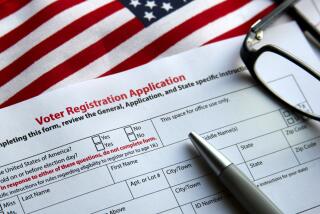No, don’t turn Social Security cards into voter IDs
Some Democrats have suddenly embraced the old notion of turning Social Security cards into national photo IDs. The goal is to undermine Republican voter suppression efforts that rely on demanding government-issued photos, by making these universally available.
What a terrible idea.
First, the endorsement parade: It was started this week by former U.N. Ambassador Andrew Young while attending a ceremony at the LBJ Library in Austin, Texas, celebrating the 50th anniversary of the Civil Rights Act of 1964. Apparently speaking off the cuff as chairman of a voting reform organization called Why Tuesday?, Young urged President Obama to order the Social Security Administration to offer a photo option on Social Security cards.
“It is our obligation to make sure that every citizen has the ability to obtain a government issued photo ID,” he said, “and the Social Security Administration is ideal for making that happen effectively and efficiently.”
Then former President Clinton picked up the baton. “It would be a good thing,” he said at the same event. “Let’s just put [a photo] on everybody’s Social Security card and give somebody something else to argue about, so we’d all have them.”
This is certainly not the first time the idea has come up. Its chances of happening are probably nil, and that’s a blessing. Here’s why.
To begin with, it wouldn’t achieve its ostensible goal, which is to take the wind out of Republican voter-suppression efforts. Dating back to before the 2012 election, more than 180 bills restricting voting rights have been introduced in 41 states, according to a compilation by New York University law school, with 27 measures ultimately passed in 19 states.
The typical rationale underlying these measures is to combat voter fraud; the problem is that almost no voter identification fraud has been shown to exist. That was one of the findings of a Pennsylvania judge who tossed out that state’s photo ID law in January, observing that voter fraud in the state was so rare that the backers of the law didn’t even bother to submit examples.
The real goal of voter restriction laws is to deny the franchise to voting communities the GOP believes will largely vote Democratic. As NYU established, although photo ID laws were introduced in 11 states, bills to limit voter registration drives were introduced in eight, reduced early voting in two, and reduced mail voting in five. At least two states (Virginia and Florida) have attempted to purge voter rolls of likely Democratic voters.
What this means is that issuing national photo IDs won’t stop the voter suppression campaigns--these other techniques will just pick up the slack.
As for the supposed virtues of placing photos on Social Security cards, these are elusive at best. It’s not necessarily easier for people to acquire new Social Security cards than other types of government photo IDs, including state-issued IDs. The same personal documentation, or more, is required, and in many places Social Security offices are harder to get to for in-person applications than, say, motor vehicle offices, which often will provide non-driver license photo IDs on request. In California there are 128 Social Security offices and 168 DMV offices.
Social Security cards aren’t needed today even to apply for Social Security benefits. Turning them into default national photo IDs would impose a new burden on an agency that is already strapped for administrative funds; as we observed last month, the Social Security Administration has cut its staff, closed half of its field offices, and shuttered hundreds of satellite offices since fiscal 2010. The agency even stopped mailing out its annual individual statements to save money.
An even bigger drawback is that the very concept of a national photo ID would inspire a new political battle. The idea is disfavored by people on the left and right; libertarian Sen. Rand Paul, R-Ky., last year introduced a bill forbidding the issuance of a national ID by any agency, and the ACLU doesn’t think any better of the idea--it’s compiled a list of five arguments against it, including the likelihood that it would become just another pretext to harass individuals thought to look or sound “foreign.”
Perhaps the worst aspect of a Social Security photo ID is that it represents a capitulation to a dishonest and sleazy campaign to disenfranchise Americans and keep them out of the voting booth by intimidation. Civil rights leaders like Young and Clinton should not give in to the threadbare rationales for tightening the rules offered by the enemies of voting rights. They’ve been fighting too long to secure those rights to back down now.
More to Read
Inside the business of entertainment
The Wide Shot brings you news, analysis and insights on everything from streaming wars to production — and what it all means for the future.
You may occasionally receive promotional content from the Los Angeles Times.











